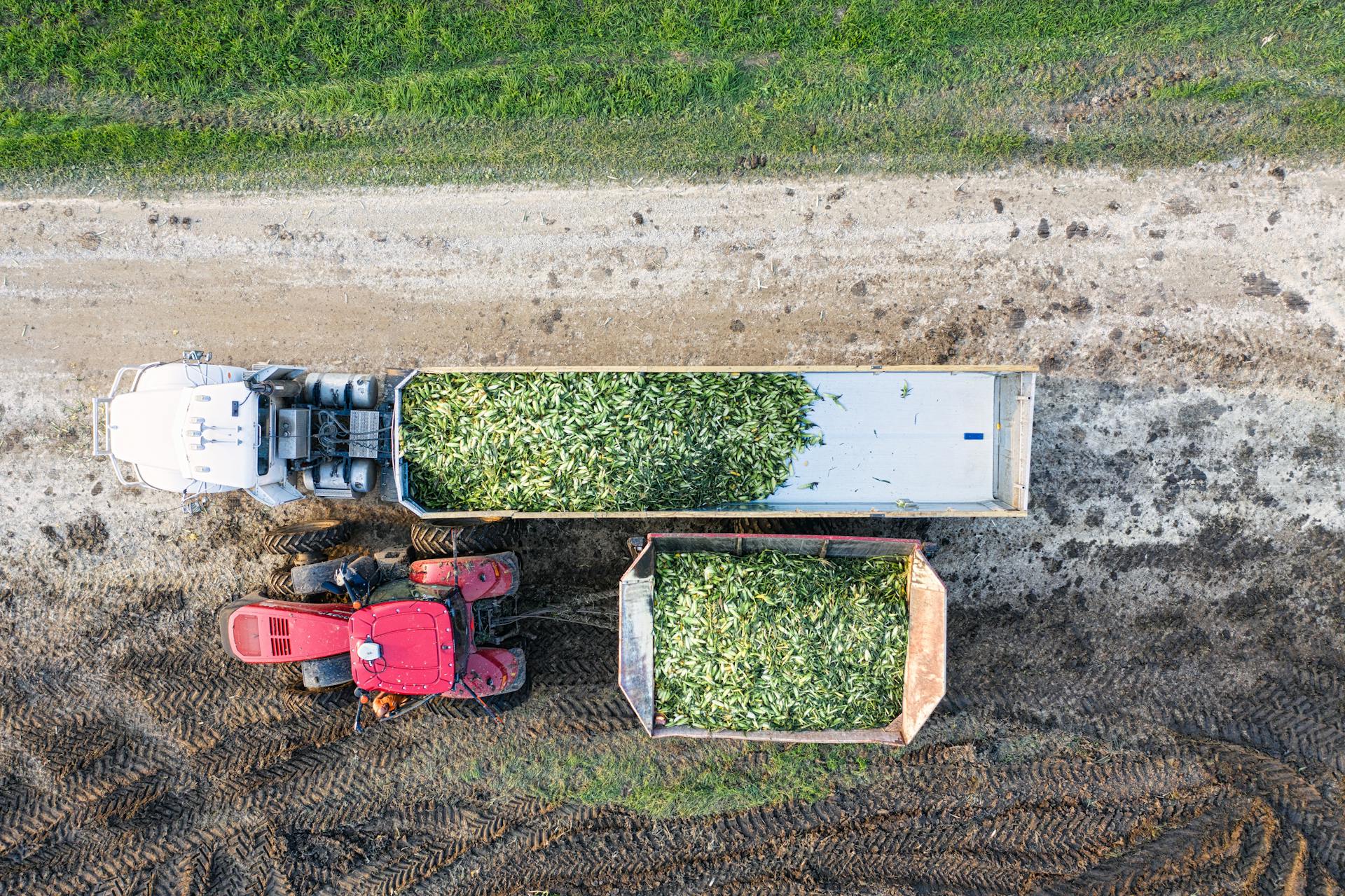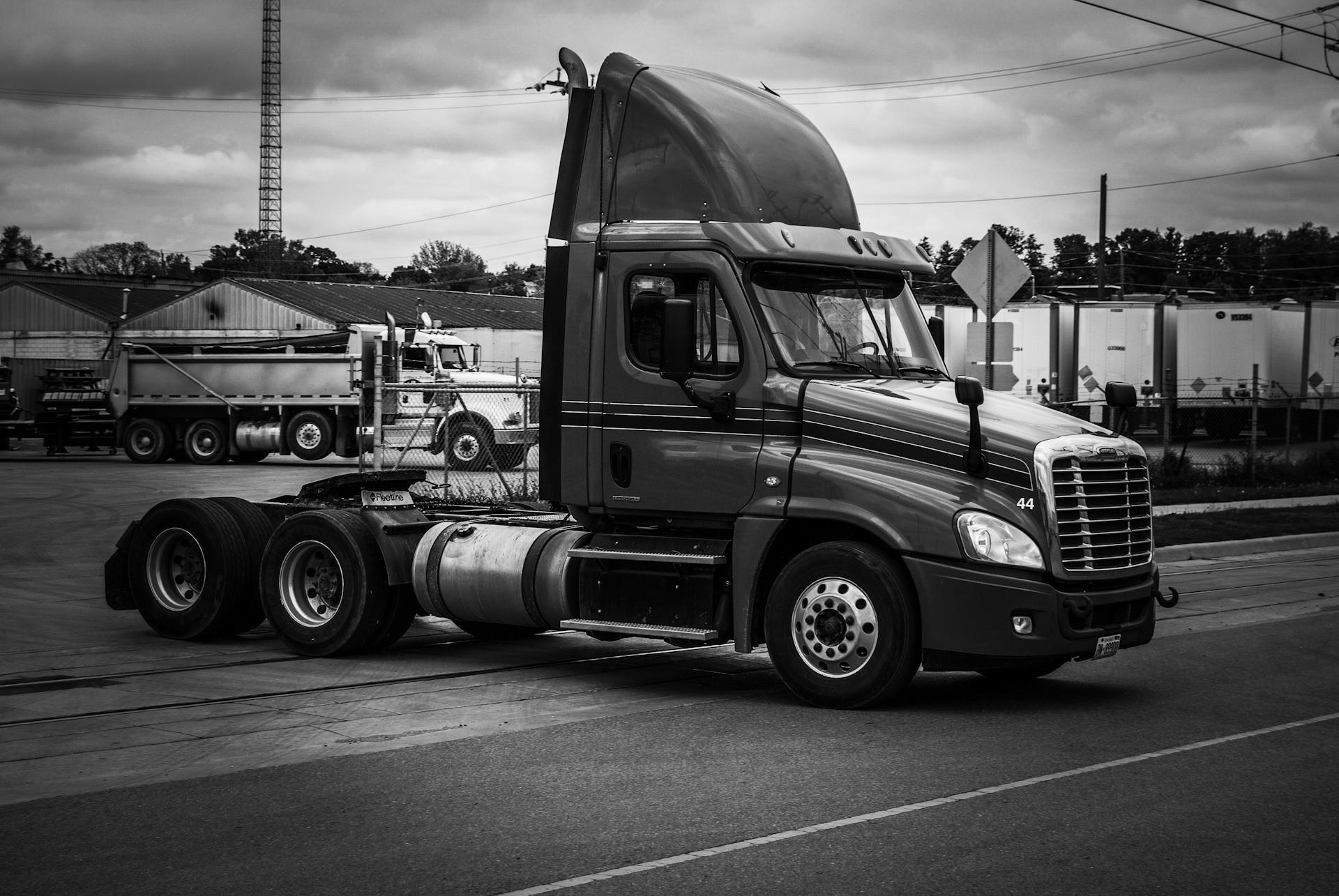
Farm semi trucks and trailers play a crucial role in agriculture by providing a reliable and efficient way to transport heavy loads over long distances. They come in various configurations to suit different farming operations.
A typical farm semi truck can carry loads of up to 80,000 pounds, making it an ideal choice for hauling heavy equipment, livestock, and produce. In some cases, they can even be equipped with specialized trailers to handle oversized loads.
Farmers often choose semi trucks with larger trailers to maximize their payload capacity and minimize the number of trips needed to transport goods. This can help reduce fuel costs and increase productivity on the farm.
Types of Grain Hauling
Grain hauling is a vital function of farm semi trucks, and there are several types to consider.
Dry grain hauling involves transporting grain in its dry form, often in bulk bins or grain carts.
Farmers typically use dry grain hauling for crops like corn and soybeans.
Liquid grain hauling, on the other hand, is used for transporting liquids like ethanol and biodiesel.
Farm semi trucks equipped with specialized tanks can handle liquid grain hauling.
Some farm semi trucks are designed for specific types of grain hauling, like grain trailers with built-in scales for accurate weight measurements.
Grain hauling can be a complex process, but with the right equipment and knowledge, farmers can efficiently transport their grain to market.
Benefits of Farmer-Owned Trucks
Farmer-owned trucks are considered the gold standard in used semis, not just for agricultural buyers but also for those from other markets.
This is particularly true of trucks owned by Midwest farmers, which also applies to farm equipment in general.
There's little doubt about the value of farmer-owned trucks, thanks to the peace of mind they bring to buyers.
Being farmer-owned means the truck or trailer likely hasn't been on the road its entire life, racking up excessive miles.
Online price research of 152 comparable trucks found a consistent 15% to 18.5% value boost for farmer-owned trucks.
This boost in value is due to the fact that farmer-owned trucks were more than likely operated by their owner, giving buyers confidence in their condition.
Trailer Options and Advantages
Farmers are taking a hard look at triple-axle hopper bottom trailers due to the opportunity to legally haul several hundred more bushels of grain.
These trailers are taller, with 66- to 78-inch sidewalls being common, and wider, with 96- or 102-inch widths being industry standards.
They're often longer too, stretching out to 48- to 52-foot lengths, which gives farmers more options for transporting grain.
With the ability to legally carry 42,000-pound and heavier loads, farmers can take advantage of the extra capacity to haul more grain.
The bushel capacities of these trailers vary, but on Wilson tri-axle trailers, for example, they range from 1,272 to 1,278 bushels, or 1,413 to 1,420 bushels with grain heaped to a 10-inch peak.
Tri-Axle Trailer Advantages
Tri-Axle Trailers are a game-changer for farmers, offering the opportunity to legally haul several hundred more bushels of grain depending on state weight limits.
These trailers are taller, with sidewalls ranging from 66 to 78 inches, and wider, with widths of 96 or 102 inches, making them ideal for hauling large quantities of grain.
Their increased capacity allows them to carry 42,000-pound and heavier loads, giving farmers more flexibility and efficiency in their operations.
Tri-Axle Trailers come in various lengths, often stretching out to 48 to 52 feet, and can have bushel capacities ranging from 1,272 to 1,278 bushels or 1,413 to 1,420 bushels with grain heaped to a 10-inch peak.
Aluminum Trailer Weight Savings
Aluminum trailers can offer significant weight savings, which is a major advantage for farmers who need to haul heavy loads.
The weight savings of aluminum components can add up quickly. A subframe made of aluminum can weigh as little as 350 pounds, while aluminum wheels can save up to 400 pounds.
Aluminum king pins can weigh between 220 to 250 pounds, and drop-leg landing gear can save between 80 to 120 pounds. Hubs and drums made of aluminum can also save around 80 to 100 pounds.
Here's a breakdown of the estimated weight savings of aluminum components in a trailer:
- Subframe: 350 to 450 lbs.
- Aluminum wheels: 300 to 400 lbs.
- King pin: 220 to 250 lbs.
- Drop-leg landing gear: 80 to 120 lbs.
- Hubs and drums: 80 to 100 lbs.
In fact, some aluminum trailer manufacturers claim that their trailers can reduce the overall weight by as much as 7,500 pounds, allowing farmers to haul an additional 134 bushels of corn.
Tips for Buying a Trailer for Farmers and Ranchers
If you're a farmer or rancher, buying the right trailer can make a huge difference in your daily operations. Consider the size of your equipment and the types of tasks you need to complete.
The article highlights that a good quality trailer can last for up to 20 years or more, so it's essential to make a wise investment.
Think about the terrain you'll be working on - a trailer with a high ground clearance can handle rough terrain and steep inclines.
Look for a trailer with a sturdy frame and a weight capacity that can handle your heaviest loads.
A well-maintained trailer can be a valuable asset, but it requires regular maintenance to keep it in good condition.
Truck Buying and Maintenance
If you're in the market for a used farm semi truck, it's essential to dig into its history before making a purchase. Trucks built during the transition years (roughly 2007 to 2010) of the truck industry adopting Tier 4 emission standards employed a mixture of pollution equipment.
A pre-Tier 4 truck will come with high miles (from at least 13 years of use) and may cost more. You'll sometimes pay a premium for these vehicles.
Start your investigation by getting the name of the seller or previous owner. Call and ask how the semitruck was maintained, how it was employed, and why it's being sold. Also ask for the maintenance logs and check to see if they were kept up to date.
Investigate whether the truck was involved in an accident and what damage occurred to the vehicle if it was in an accident. Also check if it has a salvaged title assigned to it.
A damaged frame or questionable engine can be enormously costly to repair. Uninformed buyers usually only ask about tires and brakes, which can be replaced for relatively low cost.
Go online and find that particular model's track record. Look for owners' comments regarding chronic problems, particularly regarding engines and transmissions.
Frequently Asked Questions
Do you need a CDL for a farm semi?
No CDL is required for farm semis within 150 miles of your farm, but a CDL is needed for interstate travel beyond that range.
What truck do most farmers use?
Farmers often rely on full-size pickup trucks like the Ford F-150, Chevrolet Silverado, and Ram 1500 for heavy-duty hauling and towing. These rugged vehicles are well-suited for farm work due to their impressive towing and payload capacities.
How much does a farm truck cost?
According to recent surveys, the cost of a new farm truck can range up to $60,000. If you're in the market for a farm truck, keep reading to learn more about your options and what to expect.
What are those farm trucks called?
Agro Trucks are the future replacement for traditional farm tractors, offering a versatile platform for field work and heavy load hauling.
Sources
- https://www.maximinc.com/agriculture-trucks-and-trailers
- https://www.agriculture.com/sizing-up-semis-cdl-license-7520169
- https://www.agriculture.com/machinery/machinery-insider/sizing-up-semis
- https://www.thefencepost.com/news/tips-for-farmers-and-ranchers-on-buying-a-semi-and-trailer/
- https://www.agproud.com/articles/35843-what-is-a-farm-truck
Featured Images: pexels.com


